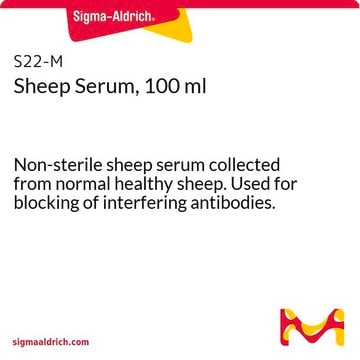11442074001
Roche
BM-Purple
Roche, pkg of 100 mL, solution
Synonym(s):
chromogenic substrate
Sign Into View Organizational & Contract Pricing
All Photos(1)
About This Item
UNSPSC Code:
12352204
Recommended Products
form
solution
Quality Level
packaging
pkg of 100 mL
manufacturer/tradename
Roche
color
dark purple
solubility
H2O: insoluble
shipped in
wet ice
storage temp.
2-8°C
General description
BM purple is a chromogenic substrate for alkaline phosphatase (AP) designed for precipitating enzyme immunoassays. It develops a permanent, dark purple band or spot at the AP binding site on the membrane or solid support. The stabilized substrate solution may be used directly from the bottle with no mixing or reconstitution. It gives less background staining than when using the BCIP/NBT two-bottle system, without a loss of sensitivity. The reaction product has a dark purple color and is insoluble in water. The dark purple color can be visually seen.
Appearance prior to use: light yellow color;
After color development: dark purple
Appearance prior to use: light yellow color;
After color development: dark purple
Application
- Colorimetric AP substrate for: Immunohistocytochemistry
- Western blot
- Southern blot
- Northern blot
- Colony and plaque hybridization
- In situ hybridization
Components
Ready-to-use solution.
Preparation Note
Working concentration: Best results have been obtained using 200 mU POD and casein as blocking reagent.
Working solution: Solubility in water: insoluble.
Working solution: Solubility in water: insoluble.
Other Notes
For life science research only. Not for use in diagnostic procedures.
Storage Class Code
12 - Non Combustible Liquids
WGK
WGK 1
Flash Point(F)
does not flash
Flash Point(C)
does not flash
Certificates of Analysis (COA)
Search for Certificates of Analysis (COA) by entering the products Lot/Batch Number. Lot and Batch Numbers can be found on a product’s label following the words ‘Lot’ or ‘Batch’.
Already Own This Product?
Find documentation for the products that you have recently purchased in the Document Library.
Customers Also Viewed
Christoph Kessle
Nonradioactive Analysis of Biomolecules null
Valentina Garcia-Lee et al.
The International journal of developmental biology, 65(4-5-6), 395-401 (2020-09-16)
The cell differentiation of the musculoskeletal system is highly coordinated during limb development. In the distal-most region of the limb, WNT and FGF released from the apical ectodermal ridge maintain mesenchymal cells in the undifferentiated stage. Once the cells stop
Jonas Malkmus et al.
Nature communications, 12(1), 5557-5557 (2021-09-23)
Precise cis-regulatory control of gene expression is essential for normal embryogenesis and tissue development. The BMP antagonist Gremlin1 (Grem1) is a key node in the signalling system that coordinately controls limb bud development. Here, we use mouse reverse genetics to
Ho Chi Leung et al.
Zygote (Cambridge, England), 1-12 (2021-09-18)
It has previously been reported that in ex vivo planar explants prepared from Xenopus laevis embryos, the intracellular pH (pHi) increases in cells of the dorsal ectoderm from stage 10.5 to 11.5 (i.e. 11-12.5 hpf). It was proposed that such
Chunyan Li et al.
Nature communications, 12(1), 1094-1094 (2021-02-19)
Seahorses have a circum-global distribution in tropical to temperate coastal waters. Yet, seahorses show many adaptations for a sedentary, cryptic lifestyle: they require specific habitats, such as seagrass, kelp or coral reefs, lack pelvic and caudal fins, and give birth
Our team of scientists has experience in all areas of research including Life Science, Material Science, Chemical Synthesis, Chromatography, Analytical and many others.
Contact Technical Service








